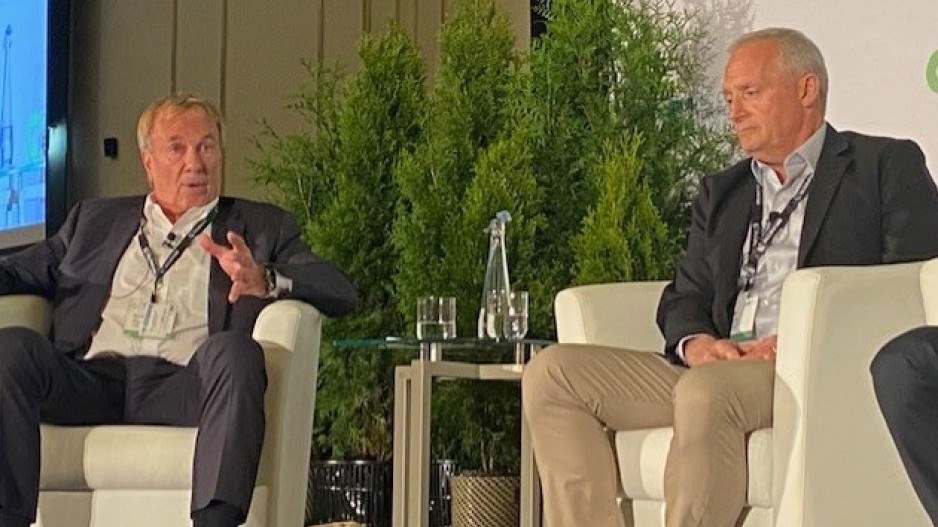In a discussion with the CEOs of two of Canada’s largest forestry companies, one might have expected to hear a lot of criticism of the John Horgan government’s forestry policies, which include removing large amounts of old growth from the timber harvest land base, and tenure reform aimed at reducing the amount of tenure held by the largest companies.
And while the CEOs of Canfor Corp. (TSX:CFP) and Wester Fraser Timber Co. (TSX,NYSE:WFG) did touch on those issues in a session at the Council of Forest Industries (COFI) conference Thursday, West Fraser Timber president Ray Ferris identified transportation as one of his company’s – and indeed the industry’s -- biggest concerns.
“I think it’s the biggest crisis we have in British Columbia that isn’t getting any airtime,” said West Fraser Timber CEO Ray Ferris.
“Pulp mills have shut down. And it has a huge impact on our customers. Our customers aren’t sure if we’re going to be able to ship our products.”
The damage done to railway tracks in the floods of November only aggravated what was already becoming a serious transportation logistics problem, Ferris said.
“This has been a long-term, steady erosion of our capacity to ship,” Ferris said. “There’s no more trucks getting into the system, so we are absolutely dependent on rail. If you look at the last five or six years -- notwithstanding significant weather events -- it’s continued to be not just a seasonal issue. It’s become more of a structural issue.
“When people start thinking about reinvesting back in Western Canada, specifically B.C., we have to have confidence that we have a transportation system that’s reliable, and will withstand increases in capacity and the impacts of climate change.”
One other challenge forestry companies face in B.C. is aboriginal rights, and the provincial government’s efforts to address reconciliation. Many forestry companies have been addressing those issues themselves by forming partnerships with First Nations.
John Mohammed, president of A&A Trading Ltd., a logging company, said his company has been doing that for nearly 20 years.
He welcomed an announcement earlier this week that the provincial government will boost forestry revenues to First Nations from three to five per cent to eight to 10 per cent.
“Revenue sharing is part of reconciliation,” he said.
He criticized the government’s old growth protection plans, saying the government had clearly failed to properly consult First Nations on the issue. While some have accepted the government’s plan to protect more old growth from logging, some are rejecting the plan.
There are concerns over a lack of investment in B.C. by forestry companies like Canfor and West Fraser, which have been investing billions to buy mills and timber rights outside of B.C., including the U.S. and Europe.
Ferris talked about the “grand bargain” that had been struck between government and industry many years ago -- the bargain being that forestry companies would get access to Crown timber in exchange for investments in sawmills and pulp mills that provide jobs.
The government is now rewriting the terms of that grand bargain, he said.
“That new bargain that’s being written, I would say many of us in this room probably feel that we’re really not part of that discussion. It’s creating a lot of uncertainty.”
From the government’s perspective, the largest tenure holders in B.C. are making some record profits on high lumber prices, but investing more in other parts of North America now, and even Europe, while shutting down sawmills in B.C.
From the industry’s perspective, their access to affordable Crown timber is shrinking, due in part to a range of government policies, and it’s becoming prohibitively expensive to operate in B.C.
West Fraser, for example, invested $600 million to retool mills to handle pine beetle kill and fire-damaged logs, Ferris said.
“What we didn’t see coming was a policy wave that was not about fire,” he said.
“We need to be re-investing back in this province, but with that you need certainty. You need to know you’re going to be able to access the fibre at a reasonable cost.
"We’re benefitting from…extremely high commodity prices, but we’re operating in a province that has some of the highest costs in North America. It’s not going to end well.”
As for global shifts in wood markets, due to the sanctioning of Russiaa, which is a major lumber producer, Canfor CEO Don Kayne said that, while China may take some Russian lumber that previously went to European buyers, he said even China's customers may still demand to see chain of custody verification, with Russian wood products becoming tainted. So while the demand is expected to continue to be be strong for Canadian wood products, there may be a shift in trade patterns and markets.
"We believe there's going to be quite a significant change over time in trade flows," Kayne said.




